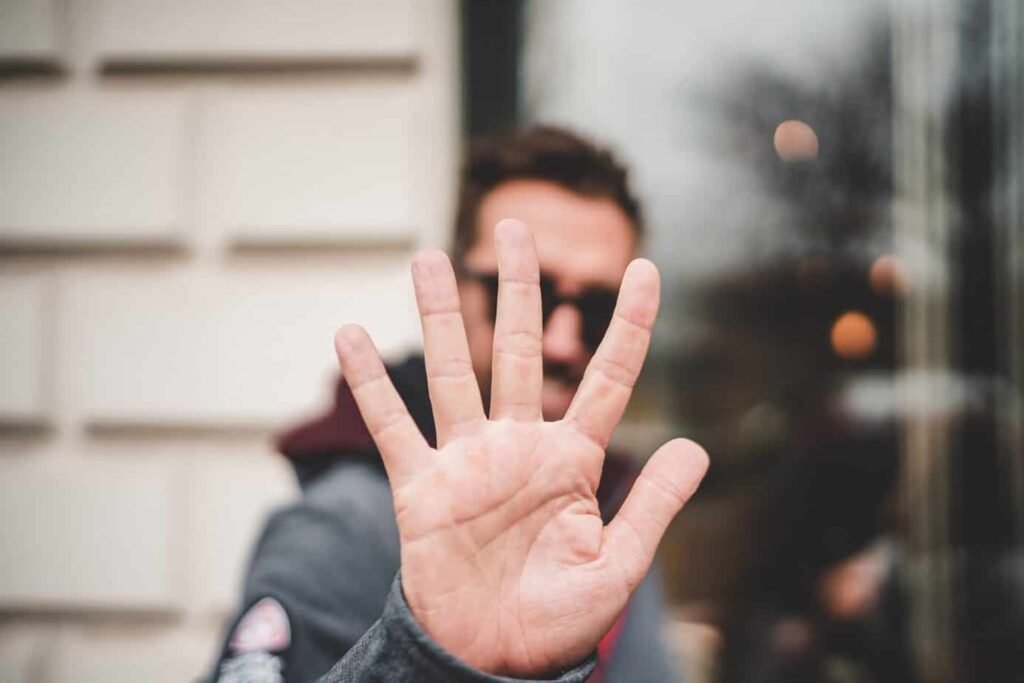Saying no is hard for many of us. Often it’s because we don’t want to hurt anyone’s feelings or we don’t feel we have a valid reason for saying no. But what is a valid reason? Moreover, who is the ultimate authority on determining whether a reason is valid?
You are.
But if you’re looking for validation, I’m here to give it to you: the need to take care of yourself and the desire to be happy are valid reasons for saying no. I hereby give you permission to say no for any of these reasons:
- You don’t feel the vibe, whether it’s the people, the space, or it just doesn’t fit your values.
- You’re feeling over-scheduled and over-burdened with other obligations.
- You’d rather do something else. Relaxing at home is a valid “something else.”
Saying no is a healthy part of setting boundaries and is one of the greatest forms of self-love and self-respect.
The subconscious effects of saying no
Wouldn’t it be nice if every invitation was one that filled you with joy and excitement? Unfortunately, that isn’t the case and the truth is we all have competing priorities. But we feel bad saying no because we think we’re being selfish. Subconsciously we’ve learned that being selfish is bad and being bad leads to rejection and therefore feeling unlovable.
So when we are presented with an invitation that we want to decline, we are faced with a decision at the subconscious level: do what make us happy and be bad/unlovable or doing something we don’t want to do and be good/lovable.
Naturally, we choose being loved. But there is a false dichotomy between saying no and being loved.
There’s two errors in this thinking:
- Saying yes to get the acceptance/love we desire is a selfish reason. So we’re being selfish either way.
- We say yes to acceptance/love but we aren’t in control of anyone’s ability to give us those things.
Unwanted impact
The impact is that we begin to live for others rather than for ourselves. We erode our sense of personal power anytime we don’t choose ourselves and our goals. Additionally, our relationships suffer as we say yes only to then feel resentful.
Learning to say no without feeling guilty is a necessary skill that we must practice. Saying no is a healthy part of setting boundaries and is one of the greatest forms of self-love and self-respect.
Saying no is exercising your personal power
Why we don’t say no
At the core, saying no scares us on some level and we want to avoid the discomfort of fear:
- Fear of conflict / confrontation
- Fear we will hurt people’s feelings
- Fear we will be seen as rude or selfish
- Fear that people will reject us
How to say no
If you’re worried about upsetting someone then make it about yourself and validate them in the process of your decline, but do so without lying. For example:
That sounds like a lot of fun and you always throw great parties [validation] but I have committed to finishing my project [personal priority] at the time.
If they’re particularly pushy, ask them if they really want to include a resentful guest and all the negative energy that will bring. This is a good time to remember that people who base your relationship on how much you do for them are not friends; they’re using you as a substitute for making themselves happy. Red flag that shit.
Change your mind
If you feel bad or guilty about saying no, alter the way you think about it. Most of us say no from a place of resisting something we don’t want. Instead, think of it as making a deliberate choice toward something you DO want.
Example 1: Say no from a place of resisting something unwanted:
I hate theme parties. I don’t want to go to this.
Example 2: Say no to go in the direction of what you do want (your happiness):
I am excited to get some work done for the book I’m writing.
There’s a different energy there and it will come across in your decline. If it’s a loved one, they will care about your happiness and be aware of your other priorities. Even if they are disappointed, they’ll be comforted that it’s not about them and more about you.
As for the rest, fuck ’em
Some people won’t like that you’re not people-pleasing them anymore. Fuck ‘em. Eventually that relationship will deteriorate and your life will flow with greater ease. You’ll then be surrounded only by people who care about your happiness, not people who rely on you to please them.
25 Ways to Say “No”
Feel free to use these templates and alter them as needed. Remember that you don’t owe anyone a justification, but it does have a way of making us feel better in our decline.
Basics
- No
- No thank you
- I’ll pass on that
- I’d rather not
- Thank you, but I’m not interested
- I need to focus on [myself/personal life/health/career] right now
- I am not making any commitments right now
Dating
- Thank you, but that’s not something I’m looking for right now
- I’m flattered by your interest, but I’m not looking to pursue anything further
- I enjoyed our time together, but I don’t want to continue
- Thank you for your interest, but I think our paths are divergent
- I appreciate the interest, but I must decline the invitation
Business
- Thank you for your contribution, but I’m taking things in a different direction
- I like your work, but I don’t feel that it’s a good match for what I’m looking to achieve
- I appreciate the request, but I don’t feel we are aligned in our objectives.
- I would love to but I can’t take on any additional responsibilities at this time. I can let you know if that changes.
Events
- Thank you for thinking of me, but I can’t make it
- Thanks, but that’s not my scene
- I appreciate the invitation, but I have other priorities
- I know this is really important to you, but there’s no way I can make it
- Thank you for the invitation, but I’ve got a full schedule already
- I’m going to have to decline, but I’ll let you know if anything changes
Loved ones
- Under different circumstances I would love to, but right now I cannot
- I love you, but that’s not something I can commit to right now
- I know this is important to you, but there are other priorities that require my attention
Saying no is one of the ultimate forms of self-care because it gives you back your most valuable assets of time, energy, and freedom to focus on whatever it is that lights you up.




